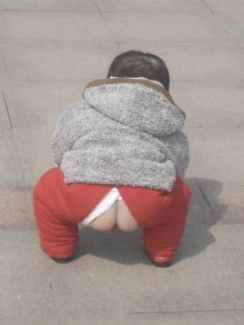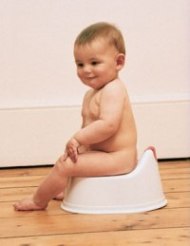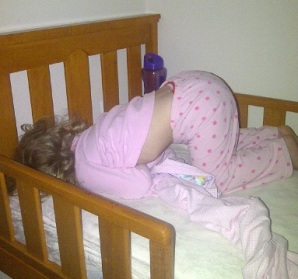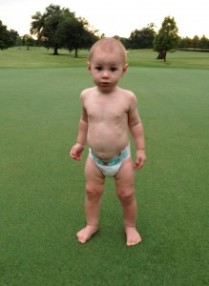This post will be one of several that I do about diapering babies, toddlers, and potty training.
If ever a “professional potty trainer database” existed, I would be in it.
I’m going to start with a few personal background tidbits. One: I believe with all my heart that if you can teach a child how to be independent, in any part of his or her life, then you should teach them. Along the same lines, if your child is capable of learning a life-skill and you fail to teach them, then you are failing as a parent. Hard-core and unforgiving stance? Yup. Wishy-washy isn’t my style.
*Note: none of this post applies to children with developmental, emotional, or physical disabilities. If you have a child that falls into one or more of those categories, then this might not apply. I certainly don’t mean to offend in that respect.
Here are several misconceptions about potty training that I hear all the time:
1) A child cannot be taught how to control their bladder and bowel muscles.
2) A child must be able to walk and talk to be potty trained.
3) A child who is potty trained never wears diapers.
4) A child must be able to pull down/up their own pants in order to be potty trained.
5) A child must be “ready” emotionally to be potty trained.
I’m going to tackle each of these one by one, citing from studies, other blogs, and personal experiences where I see fit.
Misconception #1: A child cannot be taught how to control their bladder and bowel muscles.
These are muscles. Just like other muscles in the body they can be trained. Babies learn to control their hands, feet, tongue and everything in between through positive feedback. Either a parent rewards correct movement through cheering, smiles, etc or the response in and of itself is a reward (i.e. feeling soothed when thumb sucking)
Dad-o-Matic explains the history a little bit but let me give my own take. Until disposable diapers were introduced, children world-wide were out of diapers around or before their first birthday. In areas of the world where diapers are either too expensive or not readily available, this is still true. If you don’t believe me, take a trip to China or Mongolia during the warmer months and watch the parents and little children. Many of the babies wear split-crotch pants to make peeing a truly simple task.
When the child stands up, the pants stay nicely closed. But when it’s time to “go”, it’s easy peasy.
Have you ever had the joy of teaching a child how to walk? Sure, you can let them discover it on their own but you can also speed the learning process up by giving the child every opportunity to learn foot placement and balance by holding their hands and assisting them.
What does this have to do with potty-training? Well, everything, since it is muscle training. Infants at birth have little to no muscle control. They can cry and suck but just about everything else is out of their control. They rapidly learn how to turn their head towards sounds, put their hands in their mouths, and grab toys. The rate with which they learn how to control their bodies is really amazing when you think about how little “new” stuff we learn once we’re adults.
The muscles that control the flow of bladder and the elimination of bowls can also be taught in the same way that other muscle control develops: through practice, opportunity, and positive feedback. Sadly, I lack scientific data to back this up but my experience sure confirms it!
Did you cheer, smile, and hug your baby the first time she purposefully took a toy you offered her? I sure did!!! Children love love love to be cheered and applauded and will do just about anything to get that response from an adult.
In the same way, once a child can associate releasing the bladder muscles with praise, they learn to control those muscles faster.
**** **** **** **** **** **** **** **** **** **** **** ****
I just took a 5 minute break and the 6 month old I babysit part time proved my point. I made the mistake of verbally asking my husband a question and my voice woke the baby up from her nap. It had been 2 hours so I didn’t bother trying to get her back to sleep. I picked her up and while walking to the bathroom I removed her cute polka dot pants and unsnapped her body suit. Once in the bathroom the diaper came off and I sat her on the little potty. She grabbed the little handle between her cute little knees, looked up at me and smiled, then peed. When I laughed she stopped the flow, laughed, then started going again, this time until her bladder was empty.
Is this 6 month old potty trained? Absolutely not! However, she is aware of her bladder muscles because she learned that her mommy and babysitter get excited, smile, laugh, etc when she relaxes those muscles. Over the next few months she’ll gain more and more control over them until she can hold her urine for longer periods of time. She has already mastered the art of relaxing the muscles when she wants to and that’s a big step for such a tiny little girl.
**** **** **** **** **** **** **** **** **** **** **** ****
Misconception #2: A child must be able to walk and talk to be potty trained
I’m not gonna lie: Walking definitely makes potty-training easier! Crawling is really all that’s needed and my guess is that for truly patient parents, not even that is necessary. I’ll give you my take on the walking/talking together.
As soon as the 9 month old I care for could crawl, she started crawling over to the potty to play with it. Each time she’d grab it I’d remove her diaper and place her on it. With a little repetition she learned quickly how to tell me she needed to go.
You can also teach young children a sign for potty. I chose to use the American Sign Language sign for “T” with a shake. My daughter would just wave both her hands, mimicking the shake but not the thumb portion but I knew what she was trying to communicate and that is the important part.
https://www.youtube.com/watch?v=1nUmdGiZJLg
You can see in the video (sorry for the poor quality!) that she is not really doing much more than shaking her fist but that’s all it really takes.
Misconception #3: A child who is potty-trained never wears diapers
If this were the case there’d be a whole slew of tweens who suffer from enuresis who wouldn’t be potty trained!
It is very normal for a child to urinate when asleep. The whole body relaxes and it just happens. Parents can choose to use a diaper or pull-on coverage or to just change the sheets when it happens. No big deal.
My own daughter was out of diapers during the day at the age of 14 months but continued to wear a diaper at naptime until she was about 26 months old. It wasn’t so much that she needed it during the nap but because her bladder would get so full that she couldn’t make it to the potty before wetting everything. The diaper was preventative. She still wears water-proof, washable, pull-on style underwear at night. This switch away from diapers at night has been recent and due to her waking up at night, taking her diaper off to go to the bathroom, then going back to bed with a nakey-bum!
Have you ever taken a recently potty trained child to a place where the bathrooms aren’t easily accessible? Like the park? The mall? The GROCERY STORE?!?!? Yeah, those are all fun and there are times when water-proof coverage really is nice.
Misconception #4: A child must be able to pull down/up their own pants in order to be potty trained
That’s hogwash. Would you say your child couldn’t run just because he couldn’t put on his own shoes?
Most parents need to assist their children for the basic wiping for a long time so being there to help the child remove clothing shouldn’t be an issue. If you want to help the child learn to do this herself, then you tell her to grab her waistband and help. Again, this is no big deal.
Misconception #5: A child must be “ready” emotionally to be potty trained
Raise your hand if you have a timid or stubborn child . . .
Did you raise your hand? Yeah, I did too. One is timid and the other is stubborn stubborn stubborn. She must be like her mom. And her dad. (Love that man!!!)
It is true that many children are afraid of toilets. I’m not sure why. Maybe the slightly loud flushing noise?? Splash?? A pit where things disappear forever??
If your child is sitting on the potty before normal toddler fears develop, then the fear of the potty won’t develop. The idea is to get your child to realize that going to the bathroom on a toilet or little potty is as normal as wearing a shirt and pants. It’s part of the normal routine before they can think about being afraid.
If your child is no longer an infant but a full-fledged trying-desperately-to-be-my-own-self toddler, then this is where things can get tougher.
Let me back up a little bit: I’m The Boss in my home unless my husband is home. Then WE are The Boss. This means that if I say something is going to happen, it happens come hell or high water. This approach—stubbornness if you will—works beautifully with potty training toddlers. When I say it’s time to pee on the potty then they will sit until they go. I am very careful about using The Boss tone when it comes to the children I care for. Even then I am consistent enough that the children all know I mean business. So if I tell a child it’s time to go potty, they know it’s time to go and nothing they can do will get them out of it.
I do not work on the “Do you need to go potty?” plan; I work on the “It’s time to go potty” plan. I have always worn a wrist watch and I keep close track of time. This is very useful for a home where there are 6 children under the age of 2 who all use the toilet/potty regularly. Only 1 of those children will run into the bathroom on her own and go when she needs to. The others may tell me, but they just as easily might not. Accidents are rare. I’ll share the ins and outs in another post.
Now, back to emotional readiness. . . this wasn’t how toilet training was done until 40 or so years ago. Not ever. Did you read the link to the post at the beginning of this post? It talks all about this but if you chose not to hop on over, the short-hand version is that parents were ashamed of themselves if their children were still wearing diapers at 18 months old. 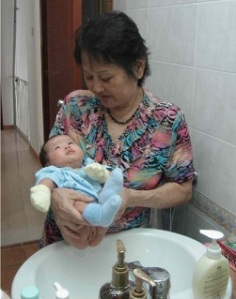 If children learned how and where to urinate for thousands (dare I say hundreds of thousands??) of years before disposable diapers, don’t you think they can do so now?
If children learned how and where to urinate for thousands (dare I say hundreds of thousands??) of years before disposable diapers, don’t you think they can do so now?
One little article on potty trained slowly shifted the entire potty training paradigm so that now most parents think they have to wait for their child to be ready.
In an article I can’t link because of ridiculous archiving issues, you can find this:
But over the last few decades, the age at which toddlers become diaper-free has been creeping upward. In 1957, 92 percent of children were toilet-trained by the age of 18 months, studies found. Today the figure for 2-year-olds is just 4 percent, according to a large-scale Philadelphia study. Only 60 percent of children have achieved mastery of the toilet by 36 months, the study found, and 2 percent remain untrained at the age of 4 years.
Moreover, though there are no hard statistics on them, pediatricians say they are seeing more children with toilet-training problems, including withholding of urine and stool, chronic constipation, and wetting and soiling by older children. Dr. Bruce Filmer, an associate professor at Thomas Jefferson University Medical School in Philadelphia, for example, says he and other pediatric urologists have noticed an increase in referrals of young patients experiencing problems with both daytime and nighttime urinary control.
These developments combined have fed a multibillion-dollar diaper industry, which last year had training-pant sales of $545 million, and have spurred the introduction of the giant-sized diaper, designed for toddlers well past the terrible 2’s.
That came from the NYTimes. The link is http://www.nytimes.com/1999/01/12/us/two-experts-do-battle-over-potty-training.html?scp=5&sq=Dr.+Brazelton+potty&st=nyt if you can get it to work for you then take a moment to read the whole thing.
Did you see?? There’s definitely a correlation between the delayed potty training and the increase of urinary/bowel problems. I’m not claiming causation, but don’t you think there’s a darn good chance that waiting for “child readiness” is in fact screwing things up??
So, get off your behind and go put your child on the potty when you know s/he is going to poop. It’s the best place to start since most of us know when our child is pooping.
